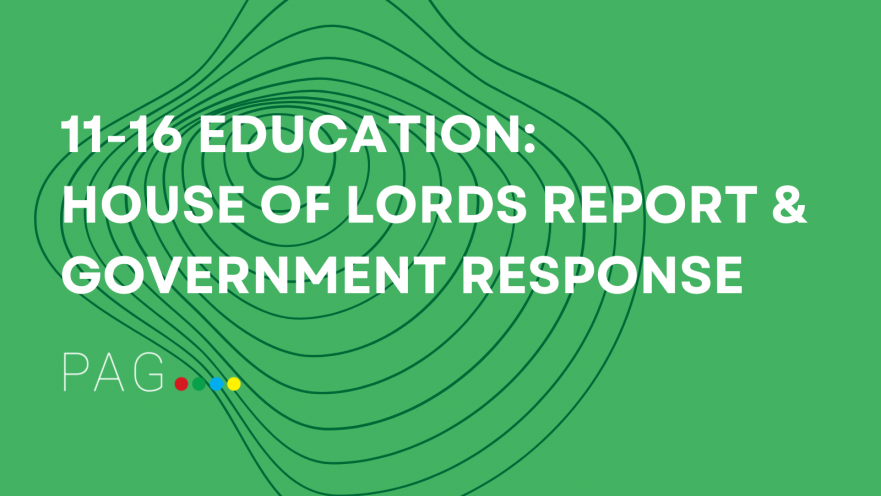House of Lords 11-16 Education Report and Government Response
Education for 11–16 Year Olds Committee Report
In a 2023 report titled ‘Requires Improvement: Urgent Change for 11-16 Education’, a House of Lords Committee outlined relatively severe reforms it felt were urgently needed to improve the standards of 11-16 year olds' education, with particular reference to the digital and green economies.
A brief summary of the changes it felt were needed can be seen below.
Key Findings and Recommendations for 11-16 Education:
• Overemphasis on Academic Learning: The current education system is criticized for its strong focus on academic learning and written exams. The Lords report suggests this approach limits opportunities for a broad and balanced curriculum and hampers the development of core skills.
• Curriculum and Assessment Reform: There's a call for the 11–16 curriculum and assessment model to be restructured. The aim is to allocate more space for technical, digital, and creative areas of study while reducing the burden of GCSE exams.
• Scrapping the English Baccalaureate (EBacc): A significant recommendation is the immediate removal of the EBacc measure, introduced in 2010, to ensure pupils take up core subjects at GCSE. Critics argue it restricts the curriculum and contributes to an overloaded system.
• Addressing Climate Change and Sustainability: The report emphasizes the need for education on climate change and sustainability across the curriculum. It reflects a broader understanding of preparing students for future challenges.
• Creative and Technical Integration: There's a suggestion to diminish the segregation of STEM and arts subjects, advocating for a curriculum that fosters cross-curricular learning, blending creative and technical skills.
Educational leaders and organisations welcomed the report, highlighting its comprehensive assessment of the issues and the practical solutions it proposed, in particular, a strong consensus for curriculum and assessment modernization to better reflect the realities and challenges of our times.
The Government's Reponse
The government has this month responded to these findings, though with an almost staunch defiance rather than an acceptance that these issues needed addressing. Its response covers a range of topics addressed, from oracy to technical and vocational education, and outlines its views on the committee’s report.
While the report in full can be found here, below you will find a summary of the first section of the document, discussing the national curriculum.
1. Curriculum Broadness and Flexibility: Concerns were raised about the need for pupils to experience a wide range of subjects until age 14 to maintain broad future options and ensure a balanced education. This included criticism of reducing key stage 3 to two years and dropping subjects, exacerbated by the autonomy of academies which aren't mandated to follow the national curriculum closely.
2. Government Review Recommendations: Recommendations for the government included reviewing the national curriculum to ensure all state-funded schools teach a broad curriculum through a three-year key stage 3 and reducing the content load of the 11–16 curriculum, especially for GCSEs, due to concerns about overloading and hampering understanding.
3. Government Response: The government has committed to not changing the national curriculum within the current Parliament to give schools stability post-pandemic and focus on literacy and numeracy. It acknowledges the issue with reducing key stage 3 to two years but does not accept the recommendations outright, stating future considerations for the curriculum in the context of the Advanced British Standard (ABS) for 16-19-year-olds.
4. Academy Autonomy and Performance: The government views academy autonomy as a strength, allowing tailoring of curricula to local needs while still expecting a broad, balanced curriculum. Evidence is cited that academies, particularly those sponsored after poor performance, show improved Ofsted ratings and pupil attainment compared to similar local authority maintained schools.
5. GCSE and Future Reforms: The government defends the current suite of GCSEs, reformed since 2011 to meet workplace and higher education demands, and does not plan fundamental reviews, citing wide recognition and support for GCSEs. Plans for the ABS for 16-19-year-olds aim for coherent education pathways without wholesale GCSE reform.
Overall, it’s certainly an interesting response to a report that could not have been clearer about what it felt was needed. While both short and long-term stability post-pandemic remain absolutely critical, it is clear that some feel there are many more issues to be addressed in 11-16 education, whether the current government chooses to address them or not.
